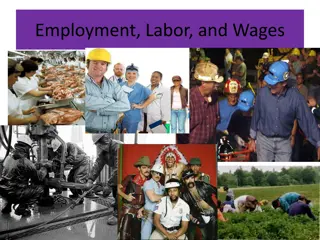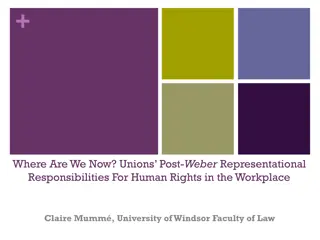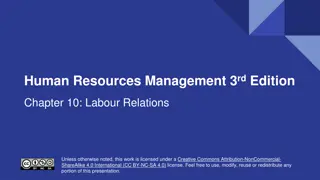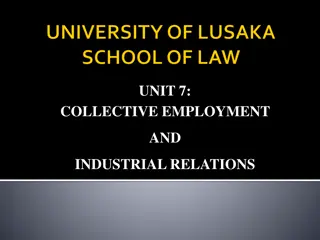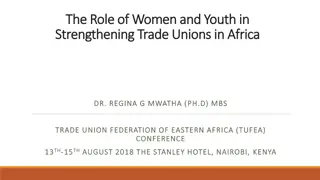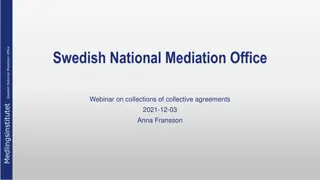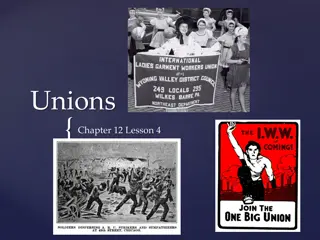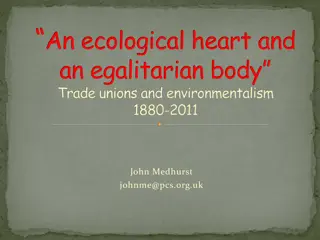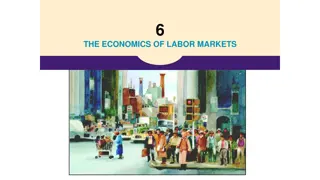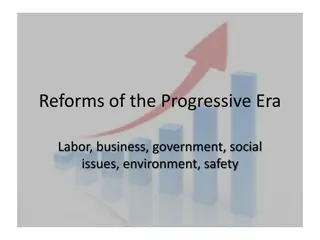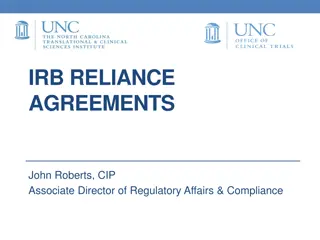Understanding Labor Unions and Collective Agreements in the Workplace
A labor union, also known as a trade union in British English or a labor union in Canadian English, is formed by workers to achieve common goals such as better pay, improved working conditions, and job security. Through collective bargaining, unions negotiate with employers to improve wages, benefits, and workplace policies. Collective agreements set out the terms and conditions of employment for workers. This content also addresses misconceptions about unions solely focusing on wage bargaining and highlights the broader roles they play in advocating for childcare issues and worker rights.
Download Presentation

Please find below an Image/Link to download the presentation.
The content on the website is provided AS IS for your information and personal use only. It may not be sold, licensed, or shared on other websites without obtaining consent from the author. Download presentation by click this link. If you encounter any issues during the download, it is possible that the publisher has removed the file from their server.
E N D
Presentation Transcript
Terminology Union:trade union(British English) labour union (Canadian English) is an organization of workers who have banded together to achieve common goals such as protecting the integrity of its trade, achieving higher pay, increasing the number of employees an employer hires, and better working conditions. Bargaining The trade union, through its leadership, bargains with the employer on behalf of union members This may include the negotiation of wages, work rules, complaint procedures, rules governing hiring, firing and promotion of workers, benefits,workplace safety and policies, maintaining or improving the conditions of their employment Collective Agreements is an agreement between employers and employees which regulates the terms and conditions of employees in their workplace, their duties and the duties of the employer.
Question #1 -True of False The first 5 unionized community based childcares were run by colleges and universities
False The first five community based unionized childcare centres were: Campus co-op daycare Centro Clinton Emmanuel Howard Park West End Parents Daycare Regal Road Daycare
Question #2 True or False The College of Early Childhood Educators' mandate is to set standards of practice that all early childhood educators are accountable to meet and increase childcare wages.
False Establishing a code of ethics and standards of practice for early childhood educators; Investigating complaints from the public about the conduct of its members and, if necessary, disciplining members; Setting standards of practice that all early childhood educators are accountable to meet; Assuring the public that members of the College will be held accountable for providing a high standard of care and early education for children.
Question #3 True of False Unions only bargain wage, benefits and advocate on child care issues.
False We do bargain wage, benefits and advocate on child care issues. We also: Handle grievances (complaints with the employer) Attending / lobbying for improvements to childcare funding with the government and other organizations Educating and strengthen our union members Informing members of political childcare issues, College of ECE, job openings etc. Provide childcare for other local, unions and political events Help fund research, political action and campaigns Provide expertise on legislation, and employment standards
Question #4 True or False CUPE Local 2484 is a composite local with 26 child care sites. The local has had two strikes.
True A composite means we have 26 different collective agreements. We bargain approximately every two years and we have had only two strikes.
Employment Standards Act vs. Collective agreements Employment Standards Act Sets minimum standards that an employer and employee must follow Collective Agreements Negotiate agreements between the employer and employees which regulate working conditions, wages, holidays/ vacations, training, grievance procedures. Often greater than minimum standards.
ESA vs. CA Example: vacation time ESA Employees earn 2 weeks vacation time upon completion of every 12 - months The ESA does not provide for any increases to the two-week vacation time entitlement although a contract of employment or collective agreement may do so. http://www.labour.gov.on.ca /english/es/pubs/guide/vacat ion.php#time CA Based on each collective agreements vacation time is agreed upon based on the number of years of service Example: 1-2 years:13 days 3-6 years:18 days 7-9 years: 24 days 9 +: 28 days
Article: You bet I care! Factors that May Influence Wage Levels: Factors that may influence average wage levels within a jurisdiction include: (i) the relative salary level for all occupations in the province or territory; (ii) the availability of recurring grants from the provincial/territorial government; and (iii) the extent of unionization. Author: Doherty, Gillian; Lero, Donna; Goelman, Hillel; LaGrange, Annette & Tougas, Jocelyne Publication Date: 1 May 2000 Source: Centre for Families, Work and Well-Being, University of Guelph http://action.web.ca/home/cfwwb/attach/ybic_report_1.pdf
Article: The union advantage in child care: How unionization can help recruitment and retention Overall, unionized child care workplaces contribute to higher quality programs and attract more experienced and more trained early childhood educators. Unions support a model of professionalism and workplace relationships that is inclusive, democratic and collective. They support professional development, affordable education and regulation of the service and the occupation. They are longstanding advocates for women's equality, and a publicly funded child care system. All of these aspects are important in and of themselves. But they also speak to some of the broader, interrelated issues that have affected the sector's ability to attract and keep qualified early childhood educators. Author: Kass, Jamie and Costigliola, Bozica Publication Date: 8 Jul 2003 Source:Child Care Connections-NS http://www.childcarecanada.org/documents/research-policy-practice/03/07/union-advantage-child-care-how- unionization-can-help-recrui
Article: What Factors Influence Wages and Benefits in Early Learning and Child Care Settings? Unionized women earn 90% of what unionized men make. Non-unionized women earn 77% of their male unorganized counterparts. In the child care sector: Unionized child care staff earn 8.3% higher than their non-union counterparts. Unionized child care settings are more likely to provide benefits such as supplementary healthcare, life insurance, employer top-up on maternity and parental and other benefits. Author: Child Care Human Resources Sector Council Publication Date: 1 Apr 2007 Source: Child Care Human Resources Sector Council Docs/2.29%2520Factors_Wages%26Benefits_Eng%5B1%5D.pdf
Article: Child care worker shortage looming But child care workers have been leaving the field in droves due to low wages and poor working conditions, said Andrea Calver of the Ontario Coalition for Better Child Care. And the better pay and benefits offered by school boards is prompting those still working in the profession to abandon their daycare jobs for the classroom, causing staff shortages in child care centres, she added. The province needs to work with colleges and universities to train more early childhood educators and encourage them to stay by improving wages and benefits throughout the sector, the coalition says. Author: Monsebraaten, Laurie Publication Date: 26 Oct 2010 Source: Toronto Star http://www.childcarecanada.org/documents/child-care-news/10/10/child-care-worker-shortage-looming
Who is local 2484? Executive Board President Vice-President Advocacy Vice-President OCBCC Recording Secretary Secretary -Treasurer Members There are 380 members all childcare workers
What does our local do? Bargains wages and benefits Ensures employers comply with pay equity, health and safety and human rights legislation Handles grievances (complaints with the employer) Advocates on child care issues Lobbies for improvements to child care funding with the government and other organizations Trains members in bargaining, grievance handling, worker rights Informs members about child care issues, College of ECEs, job openings etc. Educates and strengthens our union Provides childcare for other locals, unions and political events Help fund research, political action and campaigns
Where do the union dues go to? Roughly half of the dues money goes directly to: CUPE National/Ontario Division to cover the cost of central campaigns staffing legal WSIB Health and Safety strike funds support services operating costs etc.
Why are unions important to you? Job protection / security Negotiating for benefits / higher wages (wage grids) Job advancement (internal and external job postings) Seniority within a work place Lobbying for Pay Equity and Wage Enhancement Grants Lobbying for social justice issues for example: increasing the minimum wage, universal childcare, universal post-secondary education. Paid leaves
Unionized Centers Sunny Faces Day Care Centre - St. Benedict Site HighviewWilson Child Care Tumpane Child Care Learning Centre Children Are People Education Brookhaven Child Care Junction Day Care Centre Runnymede Adventure Club Hawthorne on Essex Daycare Lawrence Heights Community Day Care Centre Centro Clinton Day Care Garrison Creek Community Day Care West End Parents Day Care Centre Ferncliff Daycare And After School Group Baycrest Child Care Centre
Unionized Centers Hester How Day Care Centre Progress Childcare #1 Alternative Primary School Parent Group U of T U of T Early Learning Centre U of T Mississauga OISE/UT Early learning Centre Bonaventure Child Care Centre Ontario Coalition for Better Childcare Campus Community Co-Op Day Care Centre Orde Day Care Centre Orde Day Care Satellite Treetop Children's Centre Pineway Childcare Learning Center Keleemount Childcare Centre Fraser School Community Daycare St Lawrence Co-op Infant site Preschool site School Age site
CUPE National CUPE Ontario Affiliations Waiting for Childcare Canadian Child Care Federation Ontario Coalition for Better Childcare
For up-to-date information on local 2484 For more information and updates join us on Facebook CUPE Local 2484 Childcare workers Twitter: CUPE2484 Advocacy Job postings Events / childcare rallies And more .
For more information on our local visit our website: http://2484.cupe.ca/ Or contact us: memberoutreach2484@gmail.com


